I primarily want to emphasize three points in time.
The ~2007 BoB/Goonswarm culture conflict in Eve, the 2003 article "Geek Social Fallacies", and just in general comparing to 2008.
First: ~2007: The BoB/goonswarm (culture) war in Eve.
Background: MMOs used to be designed such that individuals who put the most time into the game advanced furthest. Eve was different in that character progression happened at a fixed pace. It was also a first in that sheer numbers and organization could trump everything. There had been no game like that before. This ended up having enormous cultural consequences. Consider the following text:
("TheMittani" was an SA moderator and the leader of Goonswarm
at the time in question)
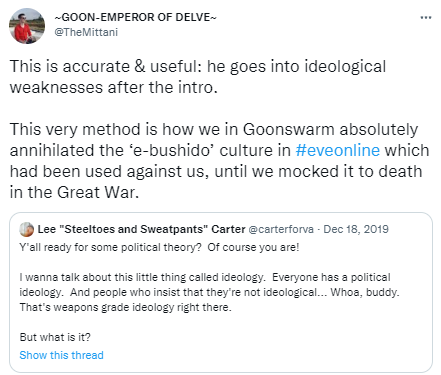
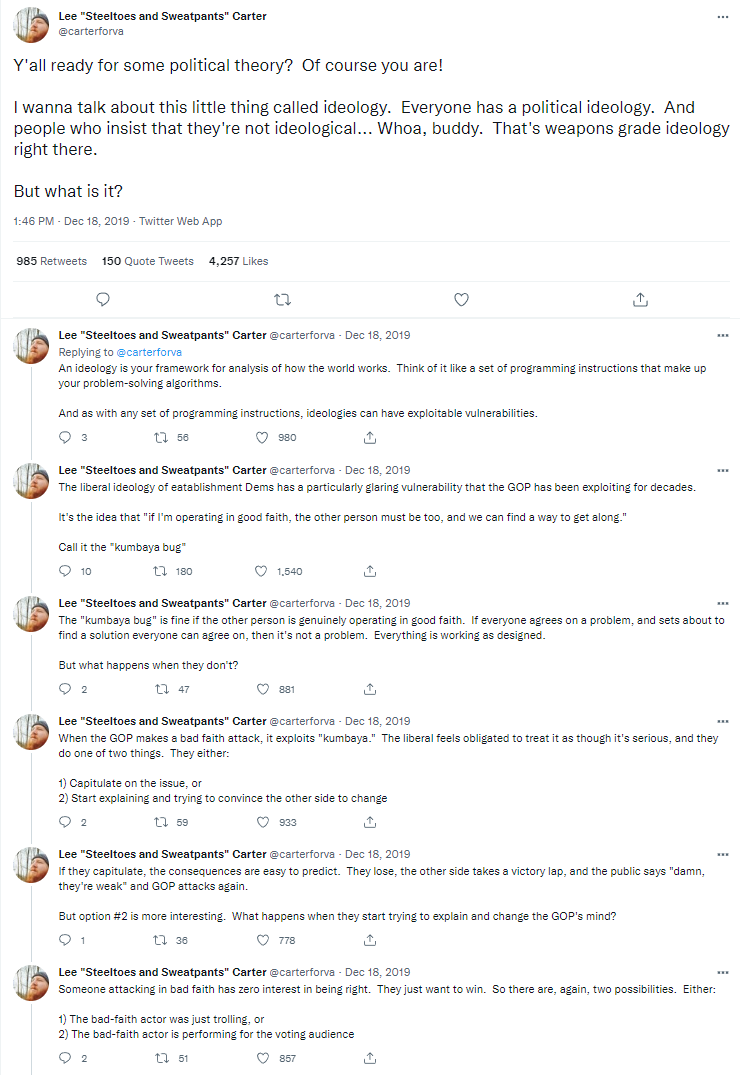
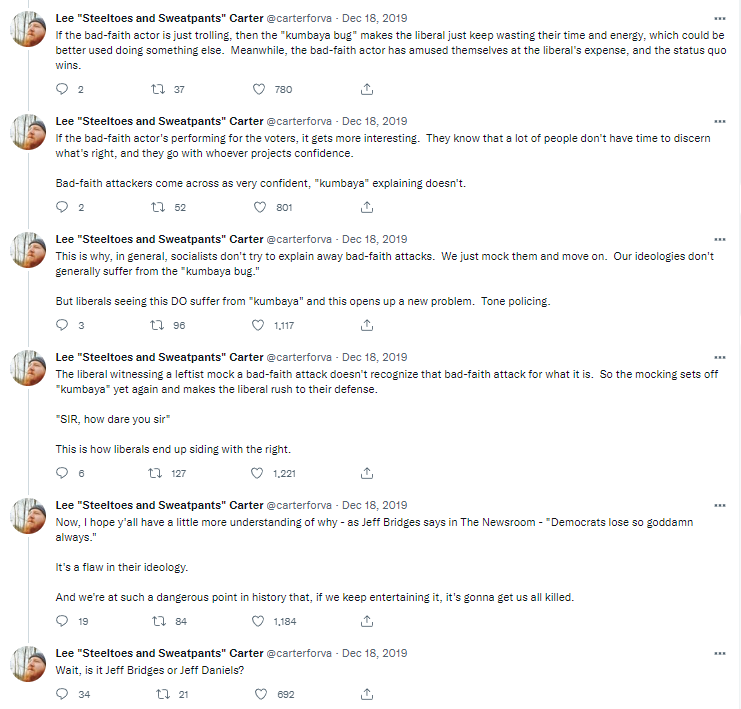
And this clip from an article describing the war:
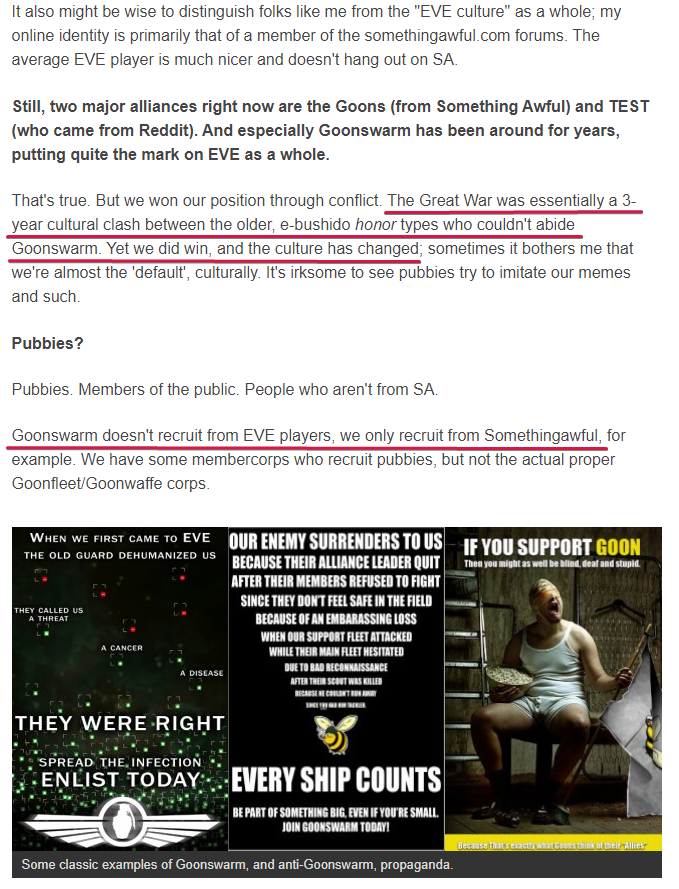
I'm quite deliberately not going to go off into commentary about this except to say that "kumbaya bug" and "e-bushido" are good terms worth making special note of. I just want special note to be made of this cultural conflict in Eve.
Next up is 2003's "Geek Social Fallacies". The only thing I'd really want to stress about this is that when it first came out, it was controversial. Most geek internet communities(particularly ones that could be described as having that "kumbaya bug" mentioned above) disagreed pretty vehemently with it. That sentiment is completely gone now. When that article in particular is discussed today, it is regarded as describing pathological behavior. More than that, this critical assessment is considered totally natural and obvious these days. Anytime similar themes pop up(usually under the broad umbrella of "tolerance"), the idea similarly is increasingly alien.
I'm going to skip any deeper analysis of it, except to say that beyond just the substance of the article, the mere fact that it exists is significant and represents a milestone. It represents the point at which sufficiently "normal" people were making their way into nerd communities to start criticizing what were at the time still the most common personalities in the "subculture".
But this is also touching on another important point and makes for a good segue into the third time period I want to cover:
There was no such thing as a nerd subculture in the 90s. Now, if we're discussing California, I quite likely am wrong about that. But California isn't the world.
Nerd hobbies are, by their nature, solitary pursuits. Even games like D&D and Magic provide as much or more engagement outside of actually playing. They are, in a sense, still solitary activities even when somebody is sitting across from you. It's like tournament chess, whose participants wouldn't be presumed to be social butterflies because they're playing games with other people. There is a distinction between a game like chess and something like volleyball, because you can easily imagine someone playing solitaire chess while that is less likely with volleyball. So someone playing Magic or chess is there to play the game...the person playing with them is helping to facilitate that game. In these early days, you end up with groups of like-minded people who are there because they genuinely like the activity...it's something they would be doing even if the groups didn't exist. And they wouldn't be there if it wasn't for the activity.
Video games in the 90s are probably the best example of such a solitary activity. Prior to online gaming, a kid could basically shut themselves out from the world and play games, perfectly happy, for hours on end. They were(and are) incredibly addictive. There is no meaning in attaching the word "subculture" to a group of people enjoying an activity in complete isolation.
So why is this important? What is the point of this?
The point is that if we remember that "geek" activities used to be largely solitary pursuits of enjoyment prior to the internet,
we realize that nothing really has been lost. From the perspective of a 1998 geek, we live in heaven. There is an availability of anime, games, music, movies, books, comics, everything that would have been unthinkable in 1998. By contrast, from the perspective of a 2003 geek(or anyone of most internet
communities over the following decade), this has been devastating, as nearly every online place has been destroyed in one way or another since. So one can feel nostalgia for a 2003 that will never return, but 1998? There is no nostalgia because the "nerd" experience in 1998 didn't yet lean so heavily on the internet.
I've noticed then a slight generational divide. There are friends I introduced D&D, Magic, and anime to in college who have been devastated by the events of the last 10 years. They'd be genuinely upset at...say...Wizards of the Coast injecting this bizarre new "progressivism" into D&D. Or Star Wars, or Magic, or one of the countless other franchises to fall. When pushed on *why* they're upset, it usually boils down to "community". And I think this is because they came into these hobbies as media for social interaction, either in real life(in college) or online. Whereas I started with these things in 1996(D&D+Magic) with small groups of local friends, grew up with console games, and started with anime in 2000 with Toonami oblivious to there being any community for it. It's difficult to explain to people who don't remember the world before the internet what it is to enjoy something that, for all you know, nobody else has ever heard of. That's what Toonami felt like those first years. It's what Final Fantasy felt like in the 90s. It's what D&D and Magic felt like...as if there was nobody playing these things outside my friends and our little corner of the world.
So, to conclude, let's take a look at one more paragraph, from the 2005 follow-up to that Geek Social Fallacies article:
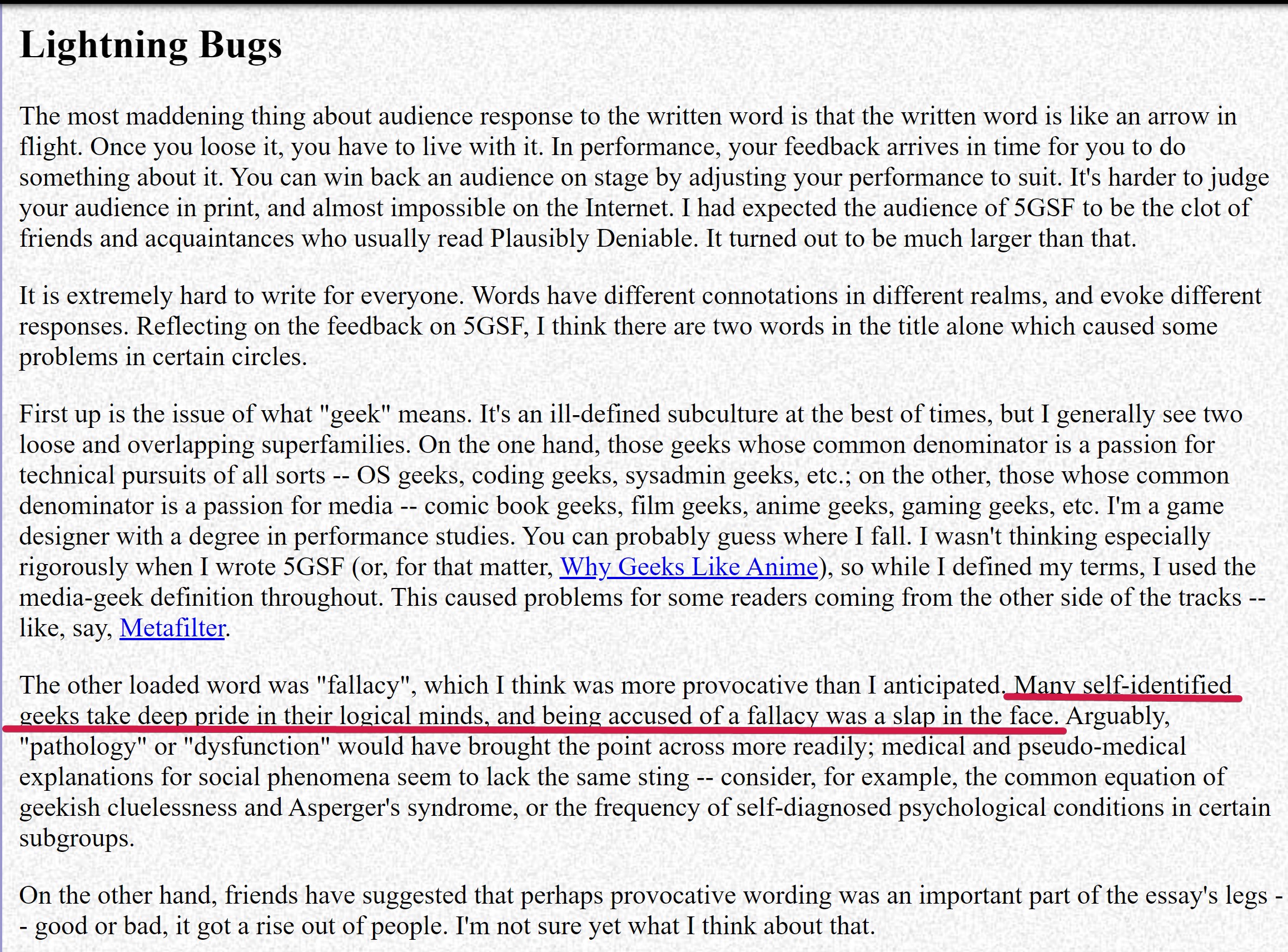
"Many self-identified geeks take deep pride in their logical minds."
Let's be real. It's possible now to easily download basically every game and every anime series older than 10-15 years. The entire collections for the Famicom, Super Famicom, Genesis, PSX, PS2, Saturn, and all older computers are at our fingertips. Every old movie, every old TV series, every old
I submit that it isn't particularly logical to turn a blind eye to this ocean of masterpieces and conclude that the world is anything other than wonderful. Abandoning an optimistic view of the world and embracing the feeling that world is doomed(for example, in the "SJWs are taking over" flavor) is unreasonable. The works that people over the decades(centuries!) have spent hard-earned money for can now be replicated for a penny of electricity. Enough masterpieces have been generated over the last century to fill a person's entire life duration with joy a hundred times over. You need only look for it.